Center for Asian Studies
Asia is a nerve center for multiple global economic, political and security challenges. The Center for Asian Studies provides documented expertise and a platform for discussion on Asian issues to accompany decision makers and explain and contextualize developments in the region for the sake of a larger public dialogue.
The Center's research is organized along two major axes: relations between Asia's major powers and the rest of the world; and internal economic and social dynamics of Asian countries. The Center's research focuses primarily on China, Japan, India, Taiwan and the Indo-Pacific, but also covers Southeast Asia, the Korean peninsula and the Pacific Islands.
The Centre for Asian Studies maintains close institutional links with counterpart research institutes in Europe and Asia, and its researchers regularly carry out fieldwork in the region.
The Center organizes closed-door roundtables, expert-level seminars and a number of public events, including an Annual Conference, that welcome experts from Asia, Europe and the United States. The work of Center’s researchers, as well as that of their partners, is regularly published in the Center’s electronic journal Asie.Visions.
Read more


Director, Center for Asian Studies, Ifri
Titre mis en avant
The Centre for Asian Studies is expanding!
The Center for Asian Studies is delighted to welcome Sylvia Malinbaum as Head of India and South Asia Research!
Before joining Ifri, Sylvia was Deputy Financial Advisor to the French Treasury at the French Consulate in Mumbai, India. She specializes in economic issues and has solid international experience.
Welcome aboard Sylvia!

Titre Bloc Axe
Research Areas
See all our interventions
Titre Axe de recherche
China
In 2017, Secretary General Xi Jinping said: "This is an era that will see China move closer to the center of the world stage". The People's Republic of China is indeed at a pivotal moment in its history, gradually acquiring all the components of power and competing with, if not surpassing, the major world powers. This new status is challenging the global balance of power, raising questions and awakening fears. The European Union and its member states are seeking to adapt their position vis-à-vis China, to face its new diplomatic assertiveness, the rise of its military and technological capacities, and to deal with the Sino-American rivalry. However, since Beijing's international policy cannot be dissociated from its domestic context, it is also necessary to analyze the internal political dynamics that dictate foreign policy choices. Through its research activities, Ifri's Center for Asian Studies aims to provide a better understanding of contemporary China and its position on the world stage.
Titre Axe de recherche
Taiwan
An area long reserved to specialists of “Greater China” and overlooked in European policy circles, Taiwan has succeeded in carving out an important space for itself on the international scene in recent years. Its management of the Covid-19 crisis has proven exemplary. Its approach to managing new digital technologies has reinforced the rule of law. Its democratic model is held up as an example in an international context of increasing polarization between liberal and authoritarian regimes. Finally, its unique know-how in the field of high-performance semiconductors made Taiwan an indispensable actor for a wide range of industries across the globe during the pandemic, and now it is sought after by many states seeking to develop their own production chains.
In a context of growing rivalry between the United States and China, Taiwan is the most serious point of contention between the two adversaries and, as such, an area of extremely high-risk friction. In fact, the strategic interest in Taiwan is just as high for Washington as it is for Beijing.
Ifri’s Center for Asian Studies analyses and interprets the critical issues around Taiwan’s emergence and its role in contemporary international relations.
Titre Axe de recherche
Japan
As the international system undergoes a major overhaul, Japan is emerging as one pillar of the multilateral rules-based order. Despite being often perceived as a declining country, it remains the world's third largest economy and, as a member of the Regional Comprehensive Economic Partnership (RCEP), the Comprehensive and Progressive Agreement for Trans-Pacific Partnership (CPTPP) and the Japan-EU Economic Partnership Agreement, plays a key role in trade liberalization and norms shaping. In recent years, Tokyo has also demonstrated a proactive diplomacy, especially in the Indo-Pacific area where it is one of the core stakeholders. In this regard, Japan has become a major partner for Europe and for France. Through its research activities, Ifri's Center for Asian Studies aims to provide a better understanding of Japan's action in the world and to foster the dialogue and cooperation between France and Japan.
Titre Axe de recherche
Korean Peninsula
One of the few countries that managed to successfully transform itself from an aid-receiving country to a donor country, South Korea is an economic success story which is often seen as a role model for emerging countries in the region and beyond. Its foreign policy seeks to capitalize on these assets but, as a middle-power, Seoul is also active in shaping a regional architecture for East Asia. However, the erratic behavior of its northern neighbor persistently undermines the stability of the peninsula, making its objective difficult to achieve. Ifri's Center for Asian Studies examines the developments on the Korean peninsula from these two complementary perspectives.
Titre Axe de recherche
India and South Asia
Despite its emergence since the end of the 1990s, India has struggled to involve its neighbours in its growth dynamic as well as to pacify its entire sub-region. South Asia remains marked by high tensions, with areas exposed to high levels of intra-state violence (Afghanistan, Khyber, Pakhtunkhwa and Balochistan in Pakistan, Jammu and Kashmir in India, to name but a few) and conflicts between states that are either without much prospect of resolution (India-Pakistan) or in a phase of aggravation (India-China). Far from experiencing a process of regional integration, South Asia has instead become the field of rivalries for influence between China and India.
Titre Axe de recherche
Southeast Asia
Over the past decade or so Southeast Asia has gone through multiple developments which usher in an era of alarming political uncertainty. While several countries were thought to be heading toward democracy (Myanmar, Thailand), recent events suggest that vested interests die hard and that defending citizens’ hard-won rights is a daunting task. In the wake of the health crisis other countries are faced with serious socio-economic difficulties which threaten their stability and wealth (Indonesia, Malaysia, Philippines). In a context of sino-US rivalry, each of the great powers seeks to push its own interests, potentially disrupting local stability. Southeast Asia has undoubtedly become a battleground for bipolar rivalry.
Through its research activities, Ifri's Center for Asian Studies aims to provide a better understanding of the evolutions and main trends of this regions' actors.
Titre Axe de recherche
Indo-Pacific Strategies
The Indo-Pacific is today a key geopolitical concept that informs the strategies of major international players. A maritime space encompassing the Indian and Pacific Oceans, the Indo-Pacific is above all a political construct that reflects the competition for influence revolving around the Sino-American rivalry. Both an economic and a political center of gravity, this mega-region is also at the heart of essential governance issues for the future (climate change, proliferation, governance of the commons — ocean, cyber, space). Its stability is threatened by transnational risks and inter-state tensions exacerbated by nationalism and the militarization of actors in the area. At the same time, the regional security architecture is now more fragmented with the emergence of new kinds of cooperation frameworks.
Through its research activities, and in conjunction with other relevant centers and programs at Ifri, the Center for Asian Studies seeks to offer a better understanding of strategic issues in the Indo-Pacific, looking in particular at the approaches of the major players in the region, including France and the European Union.
Titre Axe de recherche
Oceania
France and the European Union (EU) have issued their own Indo-Pacific strategies meant to enhance their commitment in this strategic area. Until now, the Pacific Islands – the member states and territories of the Pacific Community (SPC) – have received little attention despite their strategic importance The geographical distance and the still limited knowledge of this region in Europe certainly hamper political, economic and media interest. In this context, Ifri’s Center for Asian Studies, with the support of the Pacific Community (SPC), launches a research program in 2022 to enhance awareness of the multiple strategic issues at stake in the Pacific Islands region. While the French presidency of the Council of the EU in the first half of 2022 aims at translating the European Indo-Pacific approach into concrete actions, this research program offers an original and useful contribution to an ambitious European policy in the region. SPC supports Ifri's research program, which is structured around an opening conference (March 10, 2022), three research seminars on themes related to sustainable development, as well as a series of short publications and videos. Additional notes and events will also address a number of key geostrategic issues.
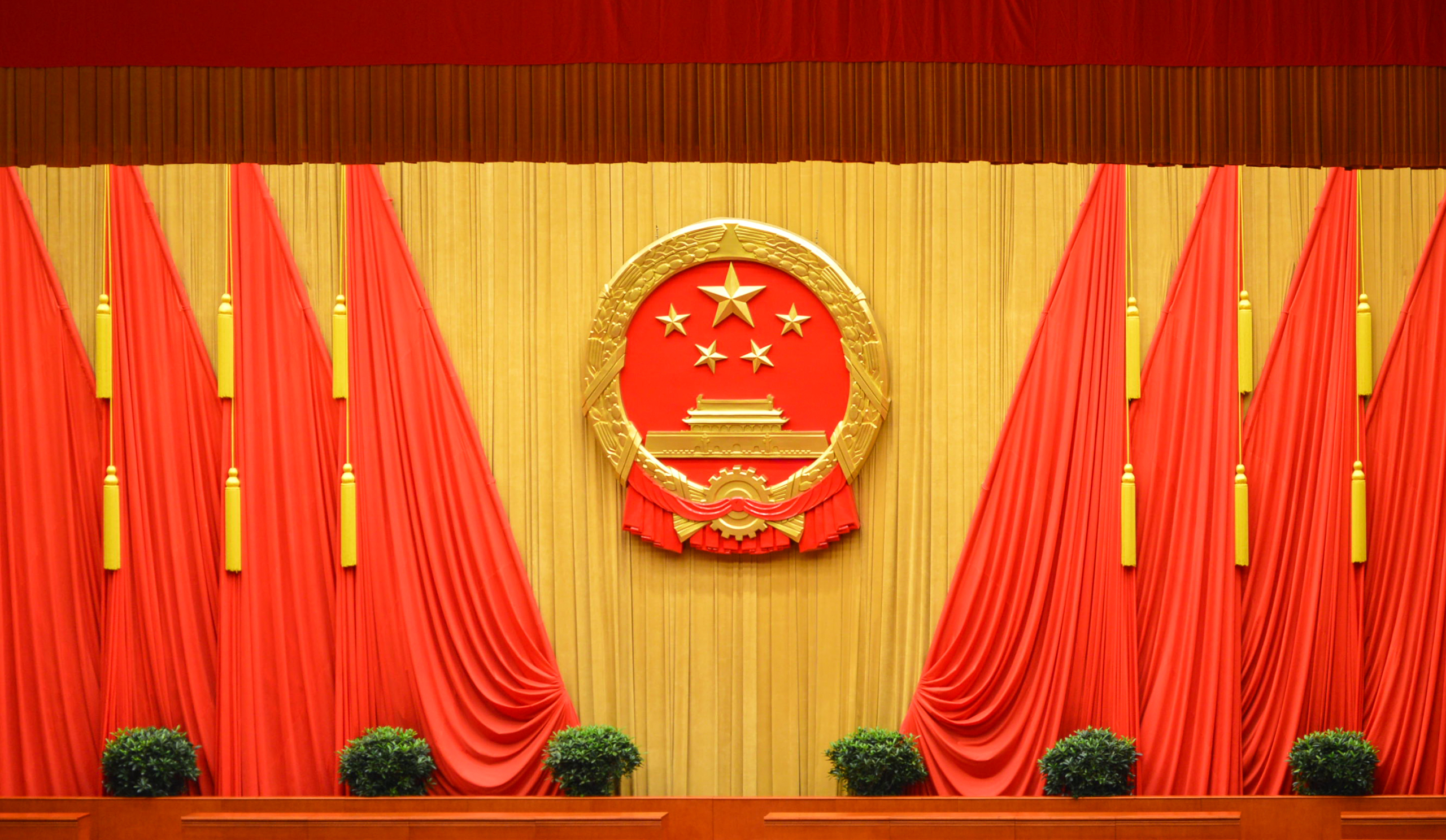


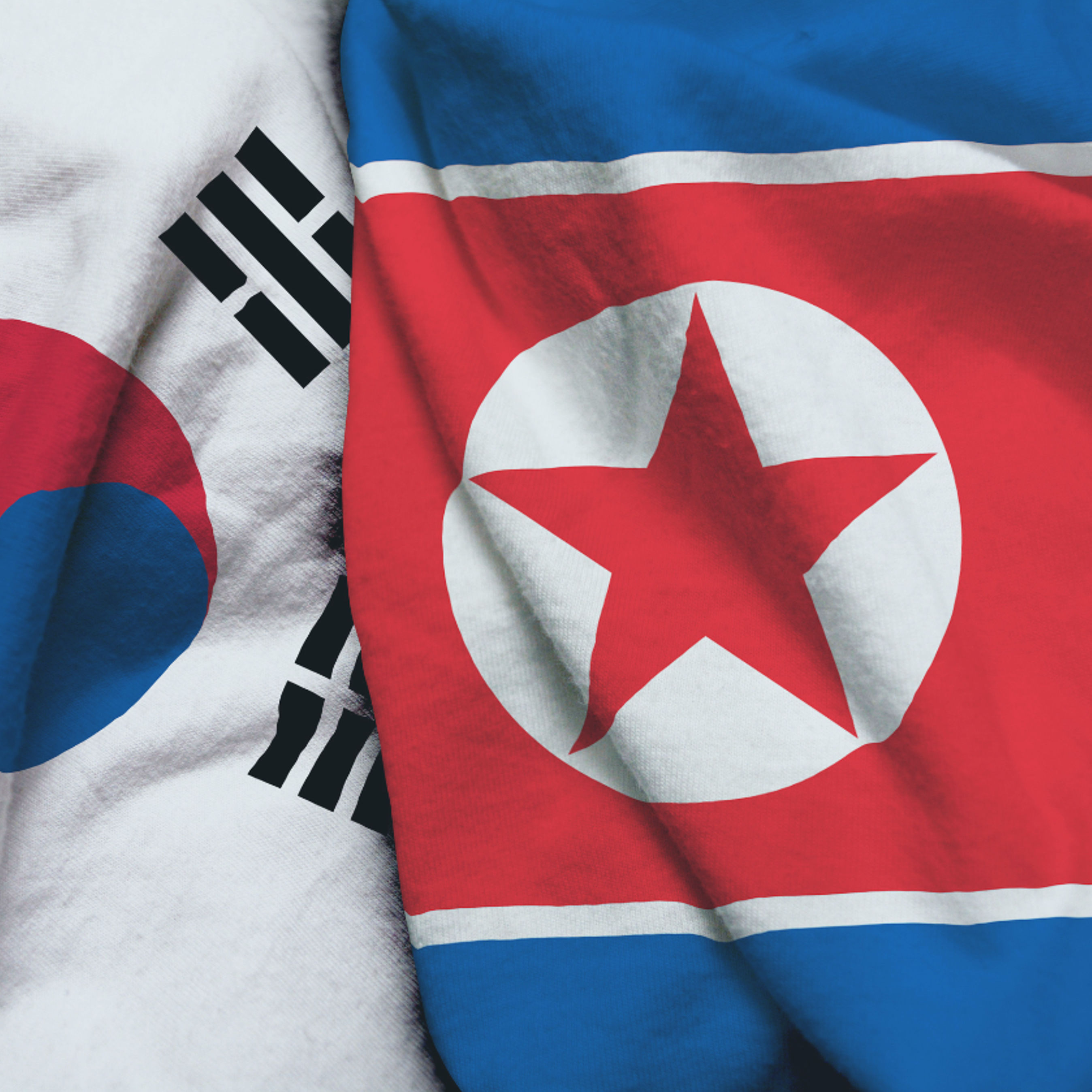

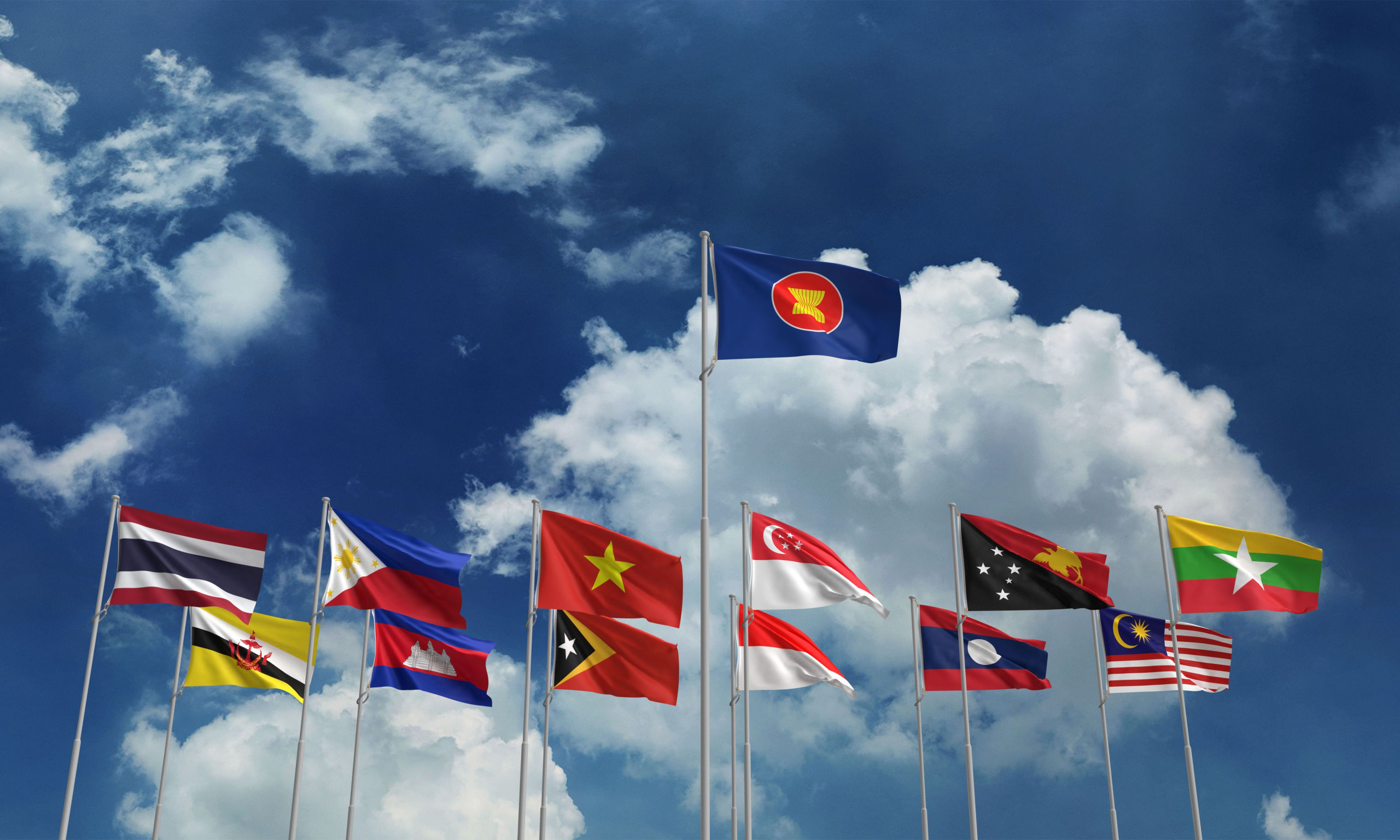


Publications
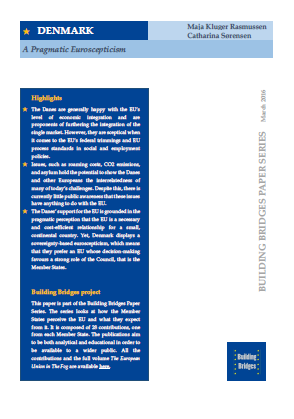
Denmark: A Pragmatic Euroscepticism
The Danes are generally happy with the EU’s level of economic integration and are proponents of furthering the integration of the single market. However, they are sceptical when it comes to the EU’s federal trimmings and EU process standards in social and employment policies.
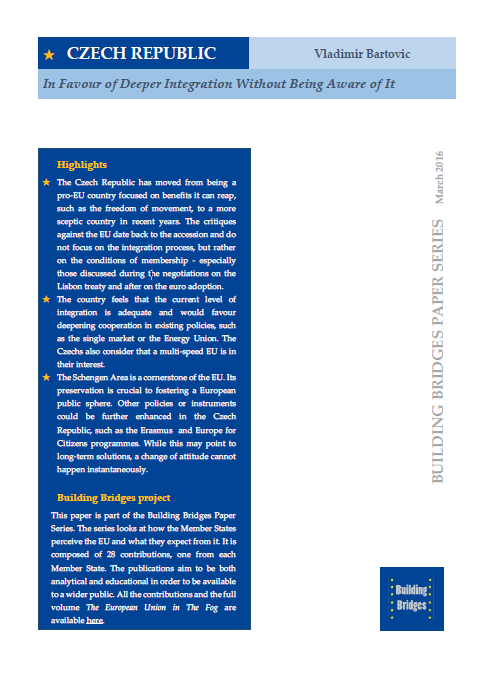
Czech Republic: In Favour of Deeper Integration Without Being Aware of It
The Czech Republic has moved from being a pro-EU country focused on benefits it can reap, such as the freedom of movement, to a more sceptic country in recent years. The critiques against the EU date back to the accession and do not focus on the integration process, but rather on the conditions of membership - especially those discussed during the negotiations on the Lisbon treaty and after on the euro adoption.
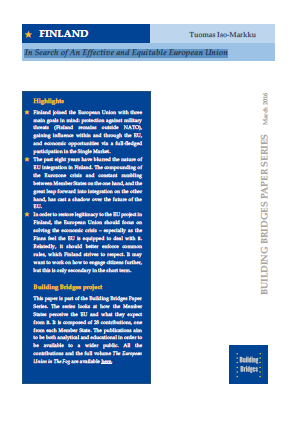
Finland: In Search of an Effective and Equitable European Union
Finland joined the European Union with three main goals in mind: protection against military threats (Finland remains outside NATO), gaining influence within and through the EU, and economic opportunities via a full-fledged participation in the Single Market.

The European Union in the Fog, Introduction.
The Building Bridges project looks at the national perspectives on the European Union. This publication gathers contributions from across the EU. It sheds light on Member States’ motivations to participate in the EU and views on its future. Accessible and analytical, this volume is an ideal reference guide for practitioners, experts, students and European citizens.
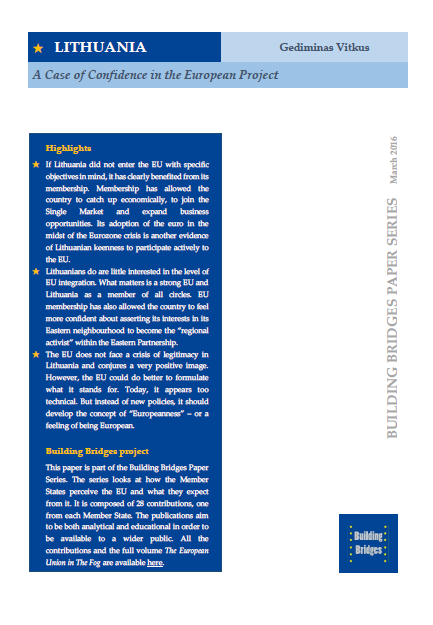
Lithuania: A Case of Confidence in the European Project
If Lithuania did not enter the EU with specific objectives in mind, it has clearly benefited from its membership. Membership has allowed the country to catch up economically, to join the Single Market and expand business opportunities. Its adoption of the euro in the midst of the Eurozone crisis is another evidence of Lithuanian keenness to participate actively to the EU.
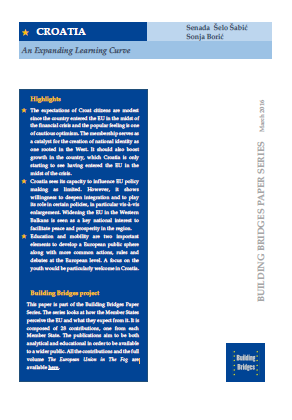
Croatia: An Expanding Learning Curve
The expectations of Croat citizens are modest since the country entered the EU in the midst of the financial crisis and the popular feeling is one of cautious optimism. The membership serves as a catalyst for the creation of national identity as one rooted in the West. It should also boost growth in the country, which Croatia is only starting to see having entered the EU in the midst of the crisis.
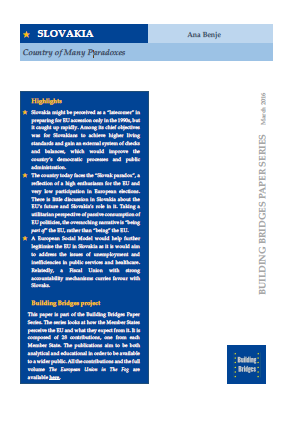
Slovakia: Country of Many Paradoxes
Slovakia might be perceived as a “latecomer” in preparing for EU accession only in the 1990s, but it caught up rapidly. Among its chief objectives was for Slovakians to achieve higher living standards and gain an external system of checks and balances, which would improve the country’s democratic processes and public administration.
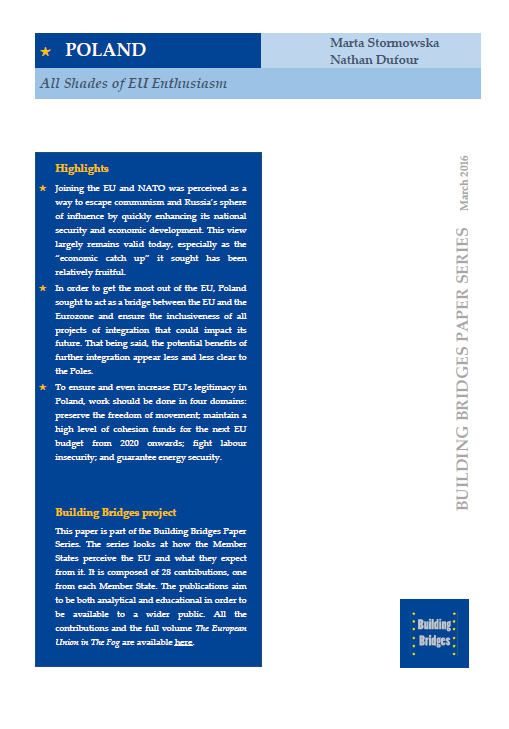
Poland: All Shades of EU Enthusiasm
Joining the EU and NATO was perceived as a way to escape communism and Russia’s sphere of influence by quickly enhancing its national security and economic development. This view largely remains valid today, especially as the “economic catch up” it sought has been relatively fruitful.
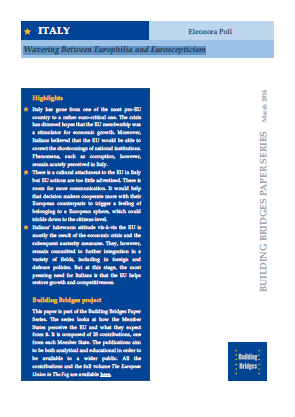
Italy: Wavering Between Europhilia and Euroscepticism
Italy has gone from one of the most pro-EU country to a rather euro-critical one. The crisis has dimmed hopes that the EU membership was a stimulator for economic growth. Moreover, Italians believed that the EU would be able to correct the shortcomings of national institutions. Phenomena, such as corruption, however, remain acutely perceived in Italy.
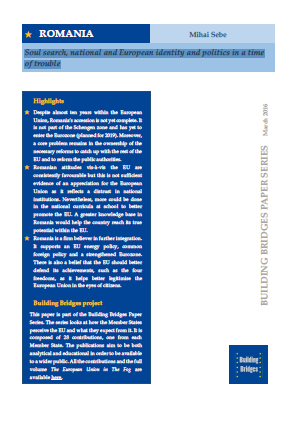
Romania: Soul Search, National and European Identity and Politics in a Time of Trouble
Despite almost ten years within the European Union, Romania’s accession is not yet complete. It is not part of the Schengen zone and has yet to enter the Eurozone (planned for 2019). Moreover, a core problem remains in the ownership of the necessary reforms to catch up with the rest of the EU and to reform the public authorities.
The Team
























